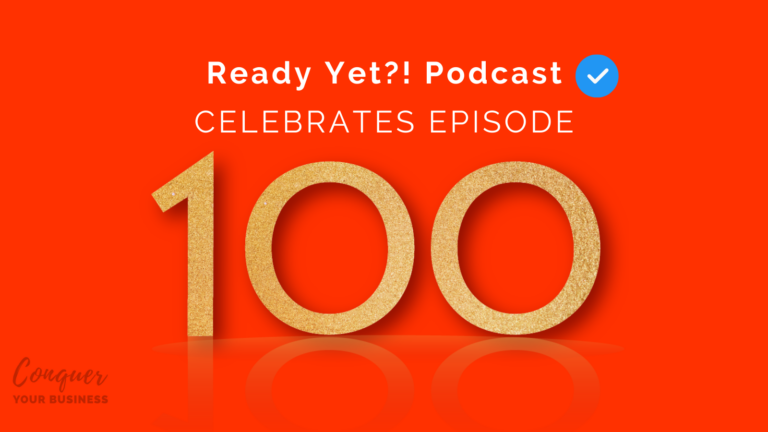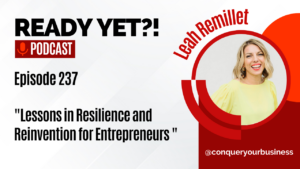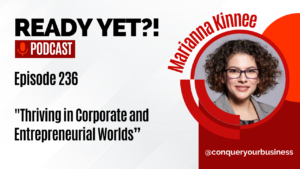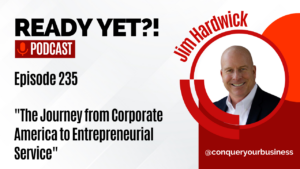Two years ago when I decided to start this podcast, my team and I were truly starting from ground zero. We had no clue how to record or publish a podcast, but what I did know was who I wanted to talk to and what I wanted to talk about. And here we are today, 100 episodes in and I’m so proud of what we’ve done. Join us today as we discuss what we’ve learned from our amazing guests and how those consistent entrepreneurial traits can help you in your business.
Resources
Transcript
Erin Marcus:
Awesome! Welcome, welcome to this very fancy, very special–Oh, my God, I seriously can’t even believe this is happening. Like, how did we get here? 100th episode, oh my God, seriously, of the Ready Yet?! podcast. As I’ve said to you several times in the last like six months as all this stuff that we’ve been doing has really been coming to fruition the last several months. A lot of this, and this included feels like that talking Head song, how did I get here? How did we get here? So, seriously though, let’s share with people, and I don’t know that we’ve told this story before, a little bit of background about you and me. We work together in corporate. So, you’re used to me more than most people. Like it’s been over 20 years that you’ve watched me do all sorts of things. So, you’re not terribly surprised. But I remember it was summer of 2020, right?
Allison Hansen:
Yup.
Erin Marcus:
And hey, so I have this idea and it really came up because of the pandemic when all my speaking gigs got canceled and they weren’t all yet back on. And we hadn’t figured out completely how to do virtual speaking, which is now no big deal because it’s totally a thing. But it was like, all right, how do we grow our audience? And so, I was like, “Oh, I could guest on podcasts.” And then me and my delusions of grandeur, why don’t we just have a podcast?
Allison Hansen:
Yeah. I almost appreciated it more because the task at first was, ‘Hey, let’s find podcasts to get booked on.’ And that alone is so overwhelming because there’s so many out there and some kind of aligned with you, but not a lot. And so, when you kind of switch gears and were like, “Hey, I’m just going to start,” when I was like, “Yes.”
Erin Marcus:
God only knows how, but this might actually be easier. So, the first thing we did was I watched some webinars on having a podcast and everything was talking about the technology and what not everybody might realize is I have infinite patience for dog rescue. I have infinite patience for wildlife rescue and animals that don’t cooperate. I have infinite patience for human beings who are scared in trying things anyway and having a hard time and not know what to do. Have zero patience for technology that I don’t know how to use.
Allison Hansen:
Less than zero.
Erin Marcus:
Less than zero. And this is not new. I will fully claim this is not an age-related problem for me because I never learned how to record on a VCR. I never learned how to set a timer on a DVR. Like, this is not a new problem for me. Just saying. Just saying. But we’re like, one of the things that I think you and I do really, really well together that’s helped immensely is, well we can figure this out.
Allison Hansen:
Totally. Yeah. Like I had zero experience with podcasts or recording or doing anything, editing sound files. I still don’t really know what I’m doing, but we’re figuring it out.
Erin Marcus:
We’re figuring. And the thing that I do know how to do is talk to people. So, we had that covered. We knew Erin could talk to people. And after freaking out over the technology, I think what I really appreciated is you called your brother. You called your brother.
Allison Hansen:
Big brother in for the rescue
Erin Marcus:
You called your big brother who has a podcast in the weirdest niche. What it’s like?
Allison Hansen:
They talk about kind of nerd culture and rum drinking. I mean, it’s super, yeah.
Erin Marcus:
It’s a little nichey. It’s a little nichey.
Allison Hansen:
They have a blast and he knows what he’s doing. So, he was a perfect resource.
Erin Marcus:
His job, he’s a mechanical engineer. Like what is his craziest job?
Allison Hansen:
Yeah. He’s an architectural engineer.
Erin Marcus:
So, he’s like a smart person who knows how to figure things out.
Allison Hansen:
Yeah, yeah.
Erin Marcus:
And he spent some time with you and I at Zoom.
Allison Hansen:
Yeah.
Erin Marcus:
And interestingly enough, he’s the one who said, “Don’t make it hard. Don’t make it hard.” And so, we stopped making it hard. And I absolutely love the fact that we’ve done now a hundred episodes of a podcast recording on Zoom. I currently today forgot to plug in my microphone and I don’t even have my ring light on, so yay me. Like don’t make it hard, make it interesting, but not hard.
Allison Hansen:
Yeah, absolutely. I mean, we’re rounding the quarter to 5,000 downloads and tons of views, great feedback. And we’re kind of flying by the seat of our pants, figuring it out as we go. And it doesn’t have to be topnotch, studio quality. You just got to dive in and do it and–
Erin Marcus:
Just got to dive in and do it. And so, one of the things, the theory behind the podcast, the whole premise of it is you’ll never do what it takes until you become the person it takes to do it. Stories with from entrepreneurs about what did they learn about who they had to be in order to get where they are. And when you talk about we figure it out, I think one of the things that we do well together is that we’re brave about our undertaking. Yeah. Right? And you can’t be brave about what you’ll try to do if you’re scared of failure.
Allison Hansen:
Right.
Erin Marcus:
We kind of just assumed failure.
Allison Hansen:
I mean, I think a reason that you and I get along so well and work well together is that we’re kind of like, well if it fails, it fails. Let’s try it.
Erin Marcus:
Let’s see what we can, right? I mean, there’s no way that everything’s going to be a hundred percent. There’s just no way. It’s not statistically possible. So, if a quarter of what you try works, all right. Okay. I mean, that’s what we’re working with. So, it just means we got to try more things. But that fearless, brave, when we look back at like, okay, so what have we learned through a hundred episodes and we’ve done some training ones, but what’s got to be a good 85, 90 interviews, what have we learned are the traits that help you become the person it takes to do the thing. Right? And that fearless, brave, don’t be afraid to fail, I’ll go a step further, embrace the failure.
Allison Hansen:
Yeah. Oh, for sure. Learn from it. You know, as you always say, it’s feedback. It’s not failure. I say that to so many people because whether they’re new to being a business owner or just something non-business related, they let any sort of failure kind of knock them down. I’m like, “Don’t! Learn from it.”
Erin Marcus:
Well, and honestly, I think for me, where some of that came from is the corporate job that we had together because my mentor Tom Senior, his whole thing was, “Well, let’s try it.” You didn’t get hit over the head for making a mistake and you have to have an environment. I still laugh within a first few weeks of you joining me and I forgot what was it. It was something that got messed up on the calendar. And at one point you’re like, “Am I even helping you at this point? Like, am I providing any value whatsoever?
Allison Hansen:
Why am I here?
Erin Marcus:
It wasn’t coming from a place of fear, Erin’s going to be mad at me. There was none of that. It was like, “Yeah, I’m doing this all wrong. Is it even helping you at this point?”
Allison Hansen:
I mean, isn’t that a weekly conversation between the two of us who were like, “Oh man, well that wasn’t supposed to happen. Sorry.”
Erin Marcus:
You do that right. That’s not how that works. And the more you can realize you’re not going to die, the more you can realize, what’s the worst that can happen? Well, the worst that can happen is nobody buys the thing when we have that launch. Well, we’ve had that happen. The worst that could happen is nobody wants listen to our webinar. We’ve totally had that happened. And yet, you learned so much from it, you make it better the next time. So, that brave, fearless piece is so important, otherwise you’re paralyzed.
Allison Hansen:
Yes. And I think that’s a huge trend with most of the people that you interview. It’s they run up to this, “Oh my god, what is going to happen,” situation and you got to just power through it and–yeah.
Erin Marcus:
You just keep going.
Allison Hansen:
Usually works out well.
Erin Marcus:
So, you said the perfect thing because I think the next trait that we’ve discovered is the persistence about it. So, not just brave, but brave over and over and over, over.
Allison Hansen:
Yeah. Absolutely.
Erin Marcus:
The persistence. Can you keep trying even when it doesn’t work?
Allison Hansen:
Yeah, exactly. And you learn from what doesn’t work and you keep going and maybe the second thing doesn’t work, guess what? You’re going to learn something else, you know?
Erin Marcus:
Yeah, exactly. Which truthfully then becomes the third thing we’ve learned. Resilient. Resilient. It all goes together because the things don’t work, the things are scary and are you resilient enough for that to happen and not knock you down? And I think resilience is something you build up, like the stuff that might use to knock me down for a month then a week, then a–well, hell that didn’t work. Now what? Right? You get better at the resilience.
Allison Hansen:
Absolutely. Yup.
Erin Marcus:
You get better and better at the resilience. So, what else would you say? The open coachable piece. What do they say the two most dangerous words in the English language are? I know.
Allison Hansen:
Yeah.
Erin Marcus:
Open and coachable. Open and coachable. There’s a big difference between open and coachable and subjecting yourself to trying to please everybody. You can’t react to every comment you get. You have to have your boundaries and trust yourself, but at the same time, are you open and coachable to learning something new, doing in a better way or I’ll go on not just from a tactical side, but one of the things I know that has worked really well for me and how far I’ve been able to come in the last couple years is embracing this idea that success is tied to how much truth you can hear about yourself without running away.
Allison Hansen:
Yeah, for sure.
Erin Marcus:
Because that’s horrifying.
Allison Hansen:
I think that’s something anyone who’s had any bit of coaching, you kind of get hit over the head with that a little bit where you’re like, “Ah, this is why I do the things I do and why what happens keeps happening.”
Erin Marcus:
Yeah. When you’re going to be persistent, that’s not the place to be persistent. Right. You learned the lesson, change the pattern, but don’t be persistent with the problem. Right? But that open to being coachable, open to accepting that maybe you don’t know everything that your way is not perfect, but open to learning something about yourself you might not like or be sad about even if it’s not something you like, you dislike, but something you might be sad about in your past and realizing that if you can’t face it, it will continue to just knock you down. And one of the things that comes up with all of this, and, and I’m trying to think, I don’t think there’s been an exception to it. In every interview that I’ve asked, and I haven’t asked it in every interview, but I’ve asked it in most interviews. But every single time I’ve asked somebody tell me what hasn’t worked, how can we help people shorten their learning curve by giving them an example of a failure, by giving an example of what didn’t work. Every single one of them laughs. And says, “Oh my God, it’s too much to–like, which one?” Nobody gets upset, right?
Allison Hansen:
They’re like, “Oh, I wasn’t expecting that question, but it’s such an important one, it really is.”
Erin Marcus:
Well, and then they don’t take themselves too seriously when they reflect on all of their failures.” Nobody gets offended. Nobody shies away from it. They’re actually more excited to talk about that than anything. “Oh, let me tell you about this one time.” And so that mixture of a sense of humor about yourself, that fine line between taking what you’re doing for others seriously, but not taking yourself too seriously. That all ties in there.
Allison Hansen:
And I think it helps a lot of people who might be in the midst of the really hard time to hear other people talking about their really hard times and how looking at it in the rearview mirror, ‘Hey, it really wasn’t that bad. And I learned all this from it.”
Erin Marcus:
And I learned all this from it. And so, two things about that. Number one, that’s one of the things that I think we have learned to try to do on purpose. What can we learn? What can we approach? What failure can we approach with gratitude over what we’ve learned instead of getting upset by it? And that takes practice. But the other thing about the failures, there’s the gurus out there, there’s the success gurus out there. And what happens though is they’re so far ahead of the rest of us, the Gary V’s, the Tony Robb, they’re so far ahead of the rest of us that you start to feel like you can’t relate to them. So, their story might be inspiring, but not necessarily motivating.
Allison Hansen:
Or attainable, yeah.
Erin Marcus:
And you think, ‘Well, I can’t do that thing. I’m not Gary V. It won’t work for me. He’s him, I’m me.’ So, there’s this big old gap, this big old separation. And one of the reasons I love sharing the failure so much is that the people that I talk to, it’s kind of more like to a fourth grader, a fifth grader is really cool. Right? It’s closer. The gap is closer. So, you might feel more relatable. It might feel like a more relatable story.
Allison Hansen:
For sure.
Erin Marcus:
So, what else? Like what are your some of your favorite situations from the interviews?
Allison Hansen:
That’s tough. I mean, as someone who has listened to all, every single episode–
Erin Marcus:
Every episode, several times.
Allison Hansen:
Yeah. Multiple times. No, I mean, I just love the willingness to share the good and the bad and kind of the dirty of being an entrepreneur. And hey, sometimes, especially solopreneurs out there, they feel really alone. Like, no one’s ever done this before. You’re blazing your own trail, which might be the case but someone has done something similar and there’s always other people out there who can help you if you’re feeling like, ‘Oh my God, what am I doing?’
Erin Marcus:
And I think one of the things the interviews and doing all these episodes have done for me, so when I left corporate and I had Caring Transitions, the first small business I owned, I thought it was going to be really, really hard to hire employees because it was a part-time job and it didn’t have a set schedule. I didn’t realize, because it was in my world, I come out of corporate, I didn’t realize that there is this whole economy of people who prefer to work part-time and really don’t care if it’s a set schedule. They like having two or three jobs that they can mix and match and it keeps life interesting for them. And the next version of that for me has been doing the podcast because while I do network, it’s a different situation than when I’m interviewing people. And I think it’s just been amazing again, not having a background and coming out of Chicago public schools and then corporate, that there’s so– entrepreneurship is not a small number of people. There are so many people with so many stories. And that when you’re in corporate, you think that’s how the world works. And I think there might be more small business owners and entrepreneurs than there are big corporations.
Allison Hansen:
Now, that we’re in that world, yeah.
Erin Marcus:
Right. Now, that we’re in that world, I see it everywhere.
Allison Hansen:
For sure.
Erin Marcus:
And that was really cool to realize, wow, it’s not what we think our view of the world is, is only because of what we’re surrounded by. And if you change your surroundings, your entire view of the world changes.
Allison Hansen:
Totally.
Erin Marcus:
And which leads me to like that last trait that I really appreciate is how many inspired, passionate people are out there.
Allison Hansen:
So, so, so many. Yeah. And a lot of the people that you interview, right off the bat, you’re like, “Tell us who you are and what you do.” So many people that you’ve interviewed, they tell what they do for a living. And I’m like, that’s a thing. Like I had no idea.
Erin Marcus:
I know. It’s so cool. Right?
Allison Hansen:
But they’re like so invested and so into it. And then I’m like, ‘God, how have I not heard about this?’ And it’s so interesting and the passion they have for it, it just blows my mind.
Erin Marcus:
Yeah. And it’s interesting having not had a job for a long time and at this point in my life feeling I am now completely unemployable, I couldn’t handle it. There’d be no way. And I was like really good in my job. I had a great corporate career, right? I would lose my mind in that environment at this point. But if you watch, if you look at social media, if you go on Buzzfeed, if you look at Reddit, it’s even on Facebook, there’s all these horrible boss threads. There’s all these horrible employee stories. And nothing could be further from my world. Nothing could be further from my world. There’s working for the weekend, Hump Day Wednesday, Hate Mondays. And nothing could be further from my world. Not just me, but any of the people I’ve interviewed and any of the people I network with. And it doesn’t mean every day is easy and it doesn’t mean any of it is easy, but none of them hate what they do.
Allison Hansen:
Right. Yeah.
Erin Marcus:
And they’re choosing to do what they do because they have an interest in what it is that they do and how they can help people doing it. In Conquer Your Business, the thing that I focus on is helping entrepreneurs and small business owners get the financial and emotional freedom that they need in order to build a business and a life they’re proud of. And thinking about all these people who just have zero affect from hating my job, being treated poorly. The money’s great, but the emotional freedom that comes with knowing that you are in charge of you is just, that’s it.
Allison Hansen:
Absolutely.
Erin Marcus:
I mean, that is it. Yeah. I mean, I think for me, that’s been my favorite part for the people I talk to. That’s what I’m most impressed by with everybody. And like you said, what everybody is just creating, not because of what they’re supposed to do, but because of what they want to do, what they’re inspired to do, what they’re able to do.
Allison Hansen:
It’s that passion project. It comes from the heart and you are all in. Even if it’s that tiny little weird niche job that no one’s ever heard of, you were all in and somebody wants to work with you. You know?
Erin Marcus:
Somebody is waiting for your message. And so, one of my mentors, and I absolutely love this, I absolutely love this. One of my mentors, someone I highly, highly, highly respect and love dearly talks about you should not be running your business with passion that. It’s an uncontrolled emotion. The definition of passion is an uncontrolled emotion. And I absolutely agree you should not be making business decisions with uncontrolled emotion. But if there is not a spark of passion behind what you’re doing, you’re not going to be able to do the things we talked about. If there’s not that spark of inspired passion laying underneath everything, you’re not going to be brave, you’re not going to be fearless, you’re not going to be persistent, you’re not going to be resilient without that piece.
Allison Hansen:
Yeah. If you don’t have that spark, then when the really hard times hit, you might just be like, “Well, bye.”
Erin Marcus:
Tried. Done. Get me out of here. Absolutely. So, I want to officially, officially, officially and massively publicly thank you for being the support behind my hair brains because we know there’d be no way this stuff would actually happen on a regular basis with consistent delivery without what you are adding. Like the willingness to figure it out is key. And so, seriously, thank you for the role because not everybody–I mean, I don’t think people realize, I just don’t imagine. Your personality is very organized. Right? Methodical, responsible. And here’s me going, “Hey, let’s do this big giant project with a thing we don’t know how to do that has to be delivered on a regularly time schedule. And let’s launch it with seven episodes all at once. So, we look like we have something to say. Oh, and you know what else? Let’s do two a week until we build up a library.
Allison Hansen:
That two a week now, and that was a lot. I’m glad we’re back to one.
Erin Marcus:
We’re very happy when that ended. But yeah, I mean that willingness. And I think that’s, yes, you work in my company, but you have your own businesses as well. You have the entrepreneur side to you. That willingness to the bottom line is just say yes. Right?
Allison Hansen:
Yeah, for sure.
Erin Marcus:
The bottom line is say yes with the confidence and trust in yourself that we are grown ass people and things are figureoutable.
Allison Hansen:
Figureoutable, yeah.
Erin Marcus:
Some things more than others are figureoutable. Some things are figureoutable and still don’t work, but hey. Right? And that’s where the magic happens, right?
Allison Hansen:
For sure.
Erin Marcus:
That’s when you find yourself having a hundred episodes and almost 5,000 downloads and the people that we’ve gotten to meet through the process, that’s where it all happens.
Allison Hansen:
And if we’re giving thank you’s, thank you for being such a badass. I mean, I obviously love working with you and, if you were doing a podcast on like how to plant a garden, I would’ve peace out a long time ago. But the content is awesome. You interview amazing people and I get something out of every week.
Erin Marcus:
I was going to say, I think you get to live your more cautious approach to life grounds me and you get to live a little vicariously.
Allison Hansen:
Yeah, we’re a good balance for each other.
Erin Marcus:
Awesome. Awesome, awesome, awesome. So, thank you to everyone who has listened, who has joined me for an episode, who has left us feedback, who has shared our podcast, who has taught us how to do a thing so that we can have the podcast. Seriously, I mean, it’s just been–I can’t even, I don’t even understand how we got here. Like, I seriously don’t even understand how I got here, but I am unbelievably grateful for it and I’m unbelievably excited about it. And I know what we have coming and I know–
Allison Hansen:
Stay tuned
Erin Marcus:
–that it’s so much freaking fun. So, thank you. Thank you. Thank you.
Allison Hansen:
Yeah, thank you.





